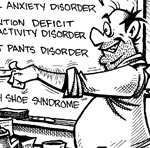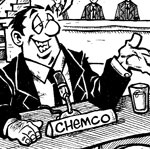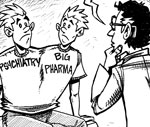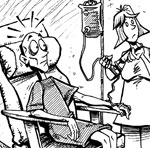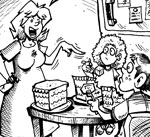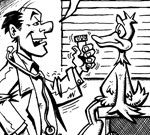Lysine - Benefits, Deficiency, Dosage and Lysine Rich Foods
| Share on Facebook | Share on Twitter | Share on Google+ |
Lysine is an essential amino acid that children need for muscle growth and those adults need to avoid buildup of ammonia in the bloodstream. Lysine is a proven antiviral supplement for colds and herpesviruses, and has even broader applications.
Lysine is a Parent Amino Acid
As an essential amino acid, lysine is both necessary for human life and only obtained from food and supplements. The human body cannot make it.
Lysine is the parent molecule for carnitine, which helps the heart operate under conditions of oxygen deprivation and stress. It is also the parent molecule for ornithine, which the body uses to remove ammonia and regulate pH, and for caproic acid, which prevents excess blood clotting.
Lysine pairs with pyridoxal phosphate, the activated form of vitamin B6, to help "rearrange" protein molecules. It can form the amino acid citrulline, which with arginine protects muscles from inflammation.
Lysine is the third most abundant amino acid in muscle tissues, after aspartic acid and glutamic acid. When lysine breaks down, it becomes acetyl CoA, which every cell in the body uses to burn glucose to release energy.
Because of lysine's interactions with another amino acid, arginine, timing is critical for successful use of lysine supplements. Lysine and arginine don't play together well in human metabolism. Because they compete for the same transporter molecules, an excess of lysine can cause a deficiency of arginine, and an excess of arginine can cause a deficiency of lysine, even if both amino acids are present in adequate amounts in the diet.
The chemical reactions in the body that use lysine also depend on, as previously mentioned, pyridoxine, also known as vitamin B6, as well as riboflavin, also known as vitamin B2, and niacin, also known as vitamin B3. Vitamin C and iron help the body absorb lysine from food.
Do Many People Suffer Lysine Deficiency?
The US National Academy of Sciences has computed lysine requirements for various stages of life.
- An infant may need as much as 99 mg of lysine for every kilogram of body weight. A 10-pound infant, for example, may need about 500 mg of lysine a day.
- Children 10 to 12 years old need about 44 mg of lysine for every kilogram of body weight. An 80-pound child may need about 1,700 mg of lysine a day.
- Adults need about 12 mg of lysine for every kilogram of body weight. A 150-pound adult may need about 840 mg of lysine a day.
An adult needs only a little more lysine than an infant. A child needs more lysine than either an infant or an adult. Children and adults of all ages, however, tend to consume far more lysine than their bodies need. The average North American adult, a study at the Massachusetts Institute of Technology determined, consumes 10 times as much lysine as the minimum recommended daily intake. Lysine deficiency is very rare.
Lysine-Rich Foods
Meat, cottage cheese and yogurt, and wheat germ are rich in lysine. Of the plant foods, only avocados are high in lysine, although most vegetables are relatively high in arginine.
| Food | Milligrams of Lysine per 200-Calorie Serving |
| Dried Cod | 5679 |
| Egg White | 5515 |
| Parmesan Cheese | 3314 |
| Pork Bacon | 3204 |
| Dried Tofu | 3157 |
| Spirulina | 3025 |
| Beef Round Steak | 3010 |
| Lamb Shanks | 3007 |
| Roast Mutton | 2999 |
| Chicken Breast | 2963 |
| Turkey Breast | 2845 |
| Non-Fat Milk | 2784 |
| Soy Nuts | 2634 |
| Salmon | 2513 |
| Pork Loin | 2513 |
| Pickled Herring | 2248 |
Both arginine and lysine use the same transporter molecules to pass through the intestinal wall into the bloodstream. If you are taking a lysine supplement, it is best not to take it within 4 hours of eating foods that are high in arginine such as wheat germ, wheat flour, walnuts, soybeans, meat, fish, dairy, chocolate, or coconut. Even though many of these founds are also high in lysine, they can only be eaten in small amounts if both the arginine and the lysine are to be absorbed. Milk, cheese, and yogurt provide both arginine and lysine, but they contain less than half as much arginine as lysine, so their lysine is more available to the body.
Lysine as an Immune Booster
Lysine is very important for restoring immune function after marasmus, a condition of protein starvation. In people who have suffered protein deprivation such as those in the photo, lysine supplements literally can make the difference between life and death. Although anyone who suffers anorexia nervosa should be getting supplements under a doctor's care, lysine would also be useful in this condition.

Lysine supplementation has little direct effect on the immune system, however, in people who have not suffered protein deprivation. The ratio of lysine to arginine in the diet, however, sometimes has very significant direct effects on viruses that are not mediated by the immune system.
Lysine for Fighting Herpes
Arginine helps the herpesvirus "break out" of the cells in which it hibernates. Lysine deprives it of the arginine it needs to make enzymes that dissolve the cells it infects so it can travel to the skin. The keys to success in using lysine to manage herpes are:
- Using enough lysine, at least 3,000 mg a day to as much as 10,000 mg a day,
- Avoiding the high-arginine foods when you take lysine (as long as they aren't in your digestive tract at the same time, it's OK to eat high-arginine foods at other times of day, at least 4 hours before or 2 hours after you take lysine), and
- Taking zinc but not copper supplements when you use lysine.
Take at least 25 mg but no more than 50 mg of zinc a day, and don't take zinc without taking copper for more than a month. The body uses copper to make the enzyme lysine oxidase, which takes lysine out of circulation. If you feel cold sores or canker sores (which are sometimes herpesvirus infections, and sometimes caused by gluten sensitivity), try taking 10,000 mg of lysine a day for 3 days and see if you can stop outbreaks before they start.
Lysine is helpful for all the manifestations of herpesviruses, including genital herpes, cold sores, and shingles as well as their complications. Every time a cold sores virus causes a blister on a lip, it comes out of hibernation in a cranial nerve. It has to inflame the nerve and break open the nerve's cell membrane to reach the skin. Inflammation of the cranial nerves can cause migraine, Bell's palsy, Meniere's disease, globus hystericus (lump in the throat), and carotidynia (pain along the length of the carotid artery). The protocol listed above may also be helpful when these conditions are recurrent, but do not take zinc without taking supplemental copy for more than 30 days at a time.
Lysine for Osteoporosis
High-protein diets can cause calcium depletion in the bones. The kidneys draw calcium from the bones to raise acidic pH caused by the breakdown of protein. They can also use glutamine to do this, but in very high protein diets there are simply too many amino acids of all kinds for the kidneys to regulate pH with glutamine alone.
Lysine slows the removal of calcium from bone. A daily supplement of just 500 to 1,000 mg of lysine daily may help the bones retain calcium so there are fewer fractures. Take lysine on an empty stomach, at least four hours after or two hours before eating. In addition to taking lysine, be sure to limit other proteins (don't go on an Atkins-style diet), and get enough calcium, magnesium, and vitamin D.
How much calcium, magnesium, and vitamin D is enough?
- The body can only absorb 400 mg of calcium at a time. Taking more than 400 mg of calcium at a time is only interferes with the absorption of other minerals. This means you will need to take 2 or 3 doses of 250 to 400 mg every day. The kind of calcium you take is not important if you are taking more than your body can absorb.
- The bones conserve calcium when they are provided with magnesium, which is also calming. Adults usually can tolerate up to 1,000 mg of magnesium at a time, but start with a smaller dose, say 400 mg, to make sure it does not cause diarrhea. Milk of Magnesia works because it provides magnesium. A total daily dosage of 600 to 1,800 mg of magnesium is recommended.
- If you live north or south of the 35th parallel, you probably will need supplemental vitamin D during the winter months. Up to 2,000 IU a day may be helpful but extremely high doses of vitamin D can cause sunlight sensitivity and, in extreme cases, the very bone fractures one takes vitamin D to avoid. You may also need vitamin D supplements even during the summer if you spend most of your time indoors in dark, air-conditioned spaces.
Is Possible to Take a Lysine Overdose?
There are not any reports in the medical literature of anyone overdosing on supplemental lysine. It is possible that the drug phenobarbital (Solfoton) would cause an elevation of lysine levels in the bloodstream in ways that interfere with amino acid balance, so do not take lysine supplements if you take phenobarbital.
Frequently Asked Questions
Q. Will lysine stop hair loss?
A. Only if it is related to "eczema gladiotorum," which is a herpes infection of the skin acquired during intimate contact, either sex or wrestling.
There is a kind of a mish-mash of product claims for lysine as a treatment for male pattern baldness. Some advertisements will point out that lysine is an essential amino acid, which it is, and then claim that their hair spray product is better for the scalp because it contains lysine. Unfortunately, the hair follicles don't respond to lysine any more than to any other amino acid, and certainly not to lysine from a hair spray for thinning hair or from a foam "hair enhancement" product.
Q. But lysine has been patented as a hair loss treatment.
A. Yes, I've read the patent. The patent is for a mixture of lysine, iron, vitamin C, and vitamin B12 given simultaneously with minoxidil and estrogen. Guys, you probably don't want to take estrogen for your hair loss. Of women given the treatment, however, 13 out of 13 reported growth of some hair. But the "anti-androgen" component of the product is and should be prescription only.
Q. Are there in lysine-enriched lip balms or ointments for topical use?
A. Yes, there are many lysine lip balms on the market. Some of the most effective combine lysine with the herb lemon balm. These products usually don't completely stop an outbreak of cold sores, but they can cut healing time in half.
Q. Is it safe to use lysine during pregnancy?
A. Lysine is not proven to be safe for use during pregnancy. If herpes is an issue during pregnancy, please consult your physician. This is an important concern during the delivery of the baby.
Q. Does lysine cure rosacea?
A. The advertisements I have seen all start with a glowing testimonial for lysine supplements as a rosacea treatment, then warn that not every kind of rosacea will respond to lysine, and close without telling the customer which kinds of rosacea will respond to lysine and which kinds won't. I am not aware of any theoretical reason lysine should help rosacea, and I am not aware of any credible evidence, even anecdotal evidence, that lysine does cure rosacea.
-
Skin CareMen Skin Care
-
Free ResourcesFree eBooks
-
Half of the modern drugs could well be thrown out of the window, except that the birds might eat them.Dr. Martin Henry Fischer
-
Featured Health Supplement
 ...a broad spectrum of around 80 of the nutrients that your body needs…including vitamins, minerals, trace elements, antioxidants,
amino acids, neuronutrients, bioflavonoids, carotenoids, herbal extracts, enzymes and other complementary co-factor ingredients.
...a broad spectrum of around 80 of the nutrients that your body needs…including vitamins, minerals, trace elements, antioxidants,
amino acids, neuronutrients, bioflavonoids, carotenoids, herbal extracts, enzymes and other complementary co-factor ingredients.
-

